- Home
- Grace Thompson
Gull Island Page 14
Gull Island Read online
Page 14
‘For shoes for Richard and the others,’ he whispered, as she was about to refuse. He stayed a while, discussing Barbara and Rosita, wanting to do something but knowing there was nothing to be done. Before he left he went to have a look at the cottage, padlocked and with that dusty air of abandonment that showed how long it had been since anyone had been inside. How stupid that the Careys lived in a hovel and this furnished place was unused.
The boat was still there but that wasn’t unused! He looked at Richard, who had followed him on his reminiscent wanderings.
‘You can use the boat whenever you want to,’ he said with an amused glance, the late sun glinting on his spectacles. ‘Just be careful and respect the sea.’
‘I should have asked.’ Richard had the grace to look guilty for a moment until defiance took over. ‘I didn’t know where you were and, well, there’s fish out there to be caught and hungry mouths here to be filled.’
Luke only smiled wider. ‘You know I don’t mind,’ he said. ‘Richard, how old are you?’
‘Ten – more like eleven.’
‘You should still be in school.’
‘What? And leave this lot to starve? I do Dad’s paper round most mornings, him being a bit weak till the middle of the day. He often does the evening round, mind. What’s the use of schooling to someone like me? I know exactly how much money is owed to us – got the figures up here, I have.’ He patted his head, flattening the raggedly cut clump of dark hair.
‘You need more than working out what’s owed to you if you’re going to achieve anything, Richard.’
‘Miss Bell thinks I’m clever.’
‘So do I, Richard. You are amazing.’
‘You ought to meet her. She’ll help you if ever you’re stuck – she’s got plenty of patience if you’re a bit slow.’
Three children climbed into the car when Luke finally left, and rode with him to the end of the narrow lane. Then, while the other two ran back shrieking with excitement, Richard stayed for an extra word.
‘What can we do, Luke, about Rosita? She shouldn’t be there with that man, should she?’
‘There’s nothing we can do. If it’s what her mother wants, then Rosita has to stay. I wish we hadn’t gone, don’t you?’ he asked the serious-faced boy.
‘No. I wanted to see her and at least I’ve done that.’
Luke drove away slowly, waving at the solitary figure who watched until he was out of sight. He was saddened and wished he had not spoken to Richard on the previous afternoon. Some things are better not known.
Before he left for France the following day, he bought two bicycles and arranged for their delivery to Richard and his father. That was something he could do to ease their monotonous, comfortless lives. If only it were that simple to help Barbara and unhappy little Rosita.
After Luke and Richard had gone, Barbara thought again about the bruises on Rosita’s body. She had pretended long enough. Blood on the girl’s underwear from weals on her body, straight lines that could only have been caused by a stick. She had chosen to believe Graham’s insistence that she was simply careless.
She had to know, although the thought of what she would have to do once she was certain frightened her. Graham was a good, hard-working man, her inner voice insisted. Although he demanded long hours of work from her, he did much more. He did get angry sometimes and had more than once threatened her with a beating. She had calmed him, promised to do better and he had never actually hit her, but she knew the threat was there. His only real fault was his unreasonable dislike of Rosita. The bruises and cuts were from beatings. She had pretended otherwise for too long.
‘They gone then?’ Rosita poked her head around the door. ‘I liked that man, Luke. He’s funny, mind, but nice. Will that beard grow till he can clean his shoes with it?’ she asked with a rare smile.
‘He’s a very kind man. Richard is nice too. I’m glad you weren’t your usual cheeky self, love. I was dreading that you’d misbehave like you do when that lady from the chapel comes with a few presents. Now why can’t you learn to be that polite with your father? He loves you and would be so pleased if you would only behave a bit better towards him.’
‘He hates me because I’m not really his. He says that. When I can’t get anything right he says I’m stupid and a truder and shouldn’t be here, bothering him.’
‘A truder? Oh, you mean an intruder. But how can you be? You’re my daughter. Your real father died a long time ago. Your name is Jones, not Prothero like Kate and Hattie, but you were here first. Remember that and you’ll behave better, I know you will.’
Graham came in then and Rosita squirmed under the table out of sight.
‘They seem pleasant people,’ he said, ‘but I don’t like having visitors. It disrupts the day. Late fetching the cows to be milked, I am, and there’s the roots not even started to be pulled.’
‘Graham, love, it was only a couple of hours – it can hardly make that much difference.’
He smiled ruefully. ‘No, you’re right. Truth is, I’m always afraid you’ll go away. Seeing someone from your early days might tempt you to leave me.’
‘How could I? You and the three girls are my life. I belong here.’
‘I – I’d be lost without you, Babs. You know I love you, don’t you?’
A low chuckle emanated from under the table and, angrily, Graham pulled out a chair and demanded that Rosita came out. ‘Out of there! I thought I told you to gather the eggs? I’ve been waiting for you to do that since this morning! Now go! If they’re hanging about the hens will start eating them and there’ll be no stopping them if they start that.’
‘I did that hours ago – they’re in the pantry!’ she said as she scuttled out of the door without turning her back on him, trying to avoid a slap.
‘No, you haven’t. I don’t believe you!’ Graham shouted. ‘A liar you are as well as useless!’
‘She doesn’t mean any harm,’ Barbara chuckled. ‘She has an irrepressible sense of humour.’
An hour later, she saw to her horror that the basket of eggs, which had been gathered that morning, was outside on the ground, tipped up, the eggs broken and, from the footsteps around it, trodden on. She looked anxiously around but there was no sign of Rosita or Graham. Then she heard the sound.
The cane swished through the air and landed on the already bruised body of Rosita. She screamed her fury as she ran to stop Graham’s hand.
‘Enough! I won’t have this! You promised me you wouldn’t hurt her any more!’
Graham looked surprised. There was no anger on his face, only dismay.
‘But she did this deliberately, Barbara. She tipped up the basket of eggs and laughed in my face. She has to be punished. Surely you can see that she has to be punished?’
‘You called her a liar and she did gather the eggs this morning as she does every day, even when it’s Hattie or Kate’s turn!’ She reached for Rosita, gathering her into her arms. Rosita was chewing her lip, trying to keep silent the sobbing that wracked her small frame.
Barbara carried her into the house as Graham stood watching, wondering if it was wiser to intervene and apologize for trying to train the girl into obedience or wait until Barbara had calmed down. He knew his wife had never been more furious; he could tell from the way her normally gentle eyes had looked at him. He’d seen reproach and something more. There was determination there and he wondered what she would do.
‘Please don’t let her leave me,’ he prayed aloud.
It was those people who came today, he decided. They had unsettled her, bringing back fanciful memories of the past. She must know chastisement was essential if Rosita was to grow up any use to anyone. She had to have the devil beaten out of her. What good would she be to a man if she was so defiant? She had to be taught to behave. Barbara would see that when she calmed down, for sure.
The next day was market day in the local town and early in the morning, Graham was up, loading the cart with surplus cockerels to be sold. Th
ey would be bought to fatten for the Christmas trade and although he would make more during Christmas week, he had decided to sell now and buy a pony for Rosita. Perhaps having something of her own would make her less difficult. He couldn’t really afford it, but losing Barbara was something he couldn’t face, and her attitude towards him since finding him in the barn punishing Rosita filled him with dread.
‘Would you like to come with me to the market this morning?’ he asked Rosita when, smudge-eyed and subdued, she came down for breakfast. By the time they had eaten, the cows had been milked and the churn was on the stand ready to be picked up by the local dairyman. Kate and Hattie had already gone to a neighbour, who had promised to look after them until they returned.
‘I’ll come if you want me to,’ Rosita said in a small voice. Barbara said nothing. She hadn’t spoken to him since the previous day and during the night she had curled up in a tight unapproachable knot of anger.
Rosita was dressed in her newest clothes, a hat and coat made to match in thick navy cloth, a navy skirt gathered into fullness and reaching well below her knees, and a hand-knitted jumper, of which she was very proud, in a dark plum colour. She wore boots that although not new were in reasonable condition, having been tapped with leather and studded at the toes and heels by Graham a few weeks before.
They set off silently. Barbara tried to sing one of the songs they frequently sang while travelling on the cart, the horse clopping an accompaniment, but the others didn’t join in.
‘Stay with me, Rosita,’ Graham said as he tethered the horse and began unloading the wire-covered boxes from the cart. ‘I have a surprise for you and I think you’ll like it.’ He left the boxes of chickens for Barbara to see to and took the girl’s hand.
There were about twenty horses offered for sale. Graham looked at the teeth for an estimate of age, felt the legs and the feet, stood back to look at the overall shape and proportions, watching for the way they reacted to being examined. He didn’t want a bad-tempered one. Rosita was all the temper he needed in his life. He stood then, holding her hand, watching while the animals were walked and trotted as the owners showed their animals’ best qualities.
‘Would you like one of these for your own?’ he asked, smiling in anticipation of her delight. ‘You and I have to get on, see, and I thought that if you had a pet of your own to care for, and I taught you to ride, well, perhaps we could start off again and be friends. It’s what I really want, Rosita, for us to be friends.’
Her brown eyes brightened, the forlorn look washed from her face and she stared at him. Her eyes were so sharp and intelligent, Graham thought. So different from her mother’s gentle, dreamy, blue ones. Her face was so unchildlike, and her expression was, yes, calculating. She looked as she always looked when she faced him: disapproving, building herself up for argument and hostility. Even with the offer of such a gift, she couldn’t smile at him. He wondered what was going on in that busy mind of hers; what words were locked away behind those tight lips.
‘You mean really mine?’ she said at last. ‘Not Kate’s or Hattie’s?’
‘Just yours. If they want to ride, they can only do so with your permission. There, what do you think?’
The brief look of animation faded. Would this be something else to complain about? Would having this huge creature to look after give him more excuses to beat her? ‘Where’s Mam?’ she asked. ‘I want to talk to Mam.’ She ran off and left him still looking at the horses and ponies.
‘Mam, he wants to buy me a pony.’ Rosita said the words dully, without a glimmer of the excitement she felt inside. She was already imagining riding wildly across the fields, thinking of the means to escape when she saw that look in Graham’s eyes that always meant a walloping for one thing or another. Perhaps she could ride so far he wouldn’t ever find her? The thought allowed a small smile to escape, which was swiftly subdued. ‘Mam, will he give me a proper hiding if I forget to brush it?’
Barbara hadn’t slept the previous night. She had lain awake making her decisions. For her own safety Rosita must go away. Tears fell every time she thought of parting from Kate and Hattie for a few days, but they would be all right. It was Rosita, Bernard’s daughter, who needed her help now.
Leaving Graham to bid for the pony he had chosen, Barbara took her daughter’s hand, led her away from the market and climbed aboard a bus just as it was leaving. Silently, Rosita sat beside her mother, seeing in the closed-up face the futility of asking questions. They changed buses in the next town and then caught a train. Where they were going, Rosita had no way of knowing, but she felt excitement growing with every mile they travelled. Wherever it was, it was away from Graham Prothero and the hated farm.
It was Barbara’s intention to find the Careys and ask them to look after Rosita until she was old enough to look after herself. She would return to Graham, Kate and Hattie and hope that, one day, when Rosita was past her difficult childhood, they would all be reunited.
They stayed one night in a cottage in Corn Town in the beautiful Vale of Glamorgan and the next day they continued their journey to the beach near Gull Island. Tired, hungry and with blisters on Rosita’s feet caused by the ill-fitting boots, they arrived to find the place empty and apparently abandoned.
They went inside and considered staying until the Careys returned. Surely they wouldn’t mind? But where were they? There were enough household goods to suggest they hadn’t gone for good. Yet there was an air of emptiness that seemed more than the absence of an afternoon.
Recent rain had come through the open door and some magazines left on the floor lay open as if just put down. They were soaked, sticking to the floor, and they tore as Barbara tried to lift them. A curtain had fallen down and mildew showed in its folds. Below the steps was a bicycle, rusted and with both tyres obviously punctured.
She went to look at Luke’s cottage. If only he were there. He would know what she should do; he would help, she knew it. But there was no sign of anyone. The place was as dead as the rocks on the beach. There was no evidence of anyone else within miles, the call of the gulls only emphasizing the loneliness.
Angry with the fate that seemed to deny her the slightest assistance, Barbara broke the locks on Luke’s cottage with a rock and went inside.
‘We’ll stay here for a while,’ she said. ‘Just until the Careys come back.’
‘I don’t mind if we stay here for ever and ever,’ Rosita said, wide-eyed. ‘Look at these chairs, Mam. All bouncy and soft and so pretty. Mam, can’t we stay for ever? He won’t find us here, will he?’
‘We aren’t running away from your father, Rosita,’ Barbara admonished. ‘We’re just arranging a little holiday for you.’
It wasn’t until the next day, when Barbara and Rosita went to town to buy food, that they learned the fate of the Careys. They had all caught diphtheria and that day had been taken to the isolation hospital. Thank goodness they hadn’t slept in their house where infection might still be present!
The first thing Barbara must do was collect and deliver the papers, and find someone willing to sell some on Henry’s usual corner. Without the few shillings his deliveries made they would be destitute. She went into the house, warning Rosita to stay clear, and found Henry’s notebook with his customers listed, together with what they owed.
The bicycle was tempting if only to carry the heavy papers or push Rosita for some of the way; they had walked so many miles on the previous day and her feet were so tender. After trying to manoeuvre the machine’s stiffened joints, riding on flat tyres and, much to Rosita’s amusement, falling off several times, Barbara decided walking was safer.
The day was spent dealing with the Careys’ customers and arranging for the following day’s selling at the usual pitch. Barbara succeeded in collecting some of the money owned to the mild-mannered man who was too kindly to insist he was paid – putting others before his own family, she thought, with mild irritation. She hid it in the house for when the family returned.
Day
s passed and Barbara wrote to Graham, telling him she would be home when she had found a place to leave her daughter. She had no fear of Graham coming to look for them: with no help apart from Kate and Hattie, who were only two and three, he was unable to leave the farm.
Although she was unsure how infections like diphtheria were carried, she knew the symptoms that had appeared regularly in the neighbours during her childhood. As a precaution she kept Rosita away from the house on the beach and every morning she examined the girl for signs of the disease. She asked repeatedly if she had a sore throat, looked in her mouth, felt her glands. Each night, as she put her to sleep in Luke’s bed, she sighed with relief that so far Rosita continued to remain healthy.
It was Sunday morning when she went to find her mother and father. Surely now they could forgive her and help their granddaughter? She didn’t even reach the house. On a corner she met her father and he stared at her, first in surprise then in anger.
‘I hope you aren’t planning to visit your mother?’
‘Yes. I’m sure she’d like to meet her granddaughter.’
‘That’s her, is it? Well, you can take it from me there’s no welcome for either of you.’
‘Who was that, Mam?’ Rosita asked as her mother pulled her away. She glanced up and saw tears of disappointment and fury in her mother’s eyes so decided not to repeat the question. ‘I’m hungry. Can we have something to eat?’ she said instead.
Richard and his father were the first to arrive home, pale and even thinner than normal after the fever that had weakened them. They were very pleased to see Barbara and hear what she had been doing.
‘Saved the business, you have, my girl, and I don’t know how to thank you,’ Henry Carey said.
Richard stared at Rosita. ‘Run away from the old man, have you?’
‘We broke into someone’s house and we’re living there as if it’s ours! Mam just smashed the door down!’ Rosita was wide-eyed as she told how her mother had broken the lock.

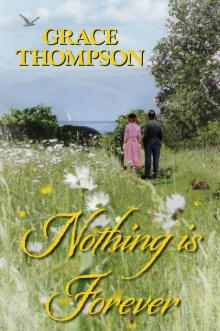 Nothing is Forever
Nothing is Forever Friends and Secrets
Friends and Secrets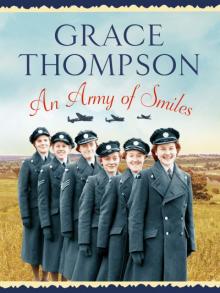 An Army of Smiles
An Army of Smiles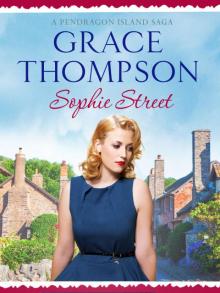 Sophie Street
Sophie Street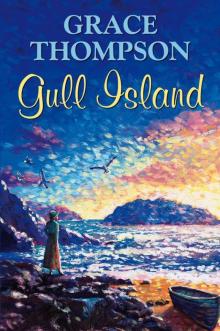 Gull Island
Gull Island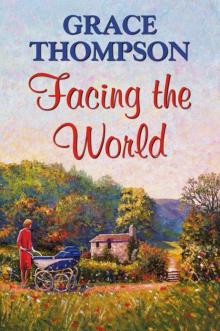 Facing the World
Facing the World The End of a Journey
The End of a Journey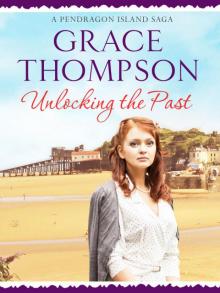 Unlocking the Past
Unlocking the Past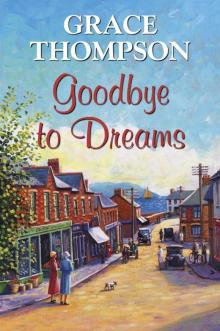 Goodbye to Dreams
Goodbye to Dreams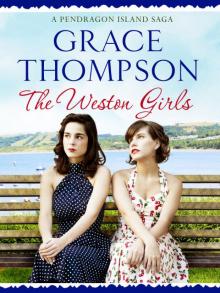 The Weston Girls
The Weston Girls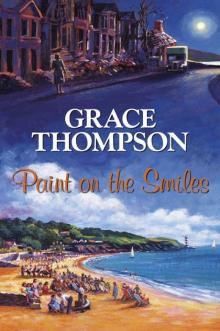 Paint on the Smiles
Paint on the Smiles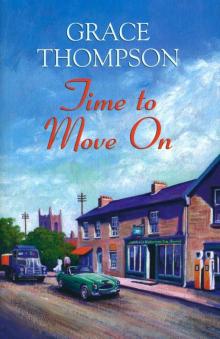 Time to Move On
Time to Move On The Runaway
The Runaway